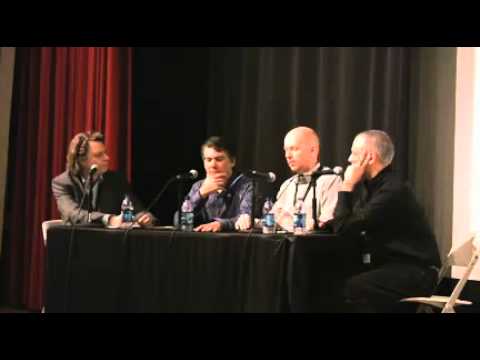A panel discussion featuring Jesper Juul, Frank Lantz and John Sharp at the Art History of Games Symposium on February 5, 2010 in the High Museum of Art’s Rich Auditorium on the campus of the Woodruff Arts Center, in midtown Atlanta. The discussion was moderated by Christoph Kluetsch. The symposium was presented by Georgia Tech and the Savannah College of Art and Design.
John Sharp is an accomplished game designer, art historian and educator with over 20 years experience. His design work is focused on Twitter and social platform games, art games and non-digital games. His current research is focused on game design curricula for after-school programs, the history of play and the early history of computer and video games.
Dr. Sharp is a professor in the interactive design and game development and art history departments at the Savannah College of Art and Design. He also is a member of Local No. 12, a social network game collaboration; a member of The Leisure Society, an artgame collective; and a partner in Supercosm, a digital media consultancy.
Jesper Juul is an influential theorist in the field of video game studies. He is currently a visiting professor at the New York University Game Center and has been a visiting scholar in comparative media studies at MIT. He holds a Ph.D. in video game theory from the Center for Computer Games Research in Copenhagen, where he held a position as an assistant professor until mid-2007.
Dr. Juul also has worked as a designer and programmer in video game and chat development, and participated in the Indie Game Jam. He has been working with the development of video game theory since the late 1990s. His more recent work deals with the fictional aspects of video games as well. His book on video game theory, Half-Real: Video Games Between Real Rules and Fictional Worlds, was published by the MIT Press in 2005. The book was named by designer Ernest Adams as one of the “50 Books for Everyone in the Game Industry.” His recently published book, A Casual Revolution, examines how puzzle games, music games, and Nintendo Wii are bringing video games to a new audience. Juul maintains the blog, “The Ludologist,” on game research and other important things.
Dr. Phil Christoph Klütsch studied Philosophy, Art History and German Literature in Freiburg, Hamburg, and Heidelberg (Germany). From 1999-2002 he worked as author, editor, and concepter for multimedia exhibitions and multimedia CD-ROM’s. He received his PhD in 2006 at the University Bremen, Germany with “Computer Graphic — Aesthetic experiments between two cultures” (Springer, Wien NewYork 2007). From 2004-2006 he worked as scientific coordinator for the interdisciplinary and international research project on Visual Hegemonies at the International University Bremen, Germany. Since 2007 he has worked as a Prof. of Art History at Savannah College of Art and Design (SCAD). His research specializes on the connection between digital art and aesthetic theory.
Frank Lantz is creative director and co-founder of Area/Code, a New York-based developer that creates cross-media, location-based, and social network games. He has worked in the field of game development for the past 20 years. Before starting Area/Code, Lantz worked on a wide variety of games as the director of game design at Gamelab, lead game designer at Pop & Co. and creative director at R/GA Interactive.
Over the past eight years, he helped pioneer the genre of large-scale, real-world games, as one of the creators of the Big Urban Game, which turned the cities of Minneapolis and Saint Paul into the world’s largest board game; ConQwest, which featured the first major application of semacodes in the United States; PacManhattan, a life-size version of the arcade classic created by the students in his Big Games class at NYU, and many other experiments in pervasive and urban gaming. For over 12 years, Frank has taught game design at NYU in the interactive telecommunications program and at the School of Visual Arts and Parsons School of Design. He is currently director of the NYU Game Center. His writings on games, technology and culture have appeared in a variety of publications.
Materials hosted by SMARTech, Georgia Tech’s institutional repository, http://smartech.gatech.edu/.
Georgia Tech
Source




I <3 Jesper Juul